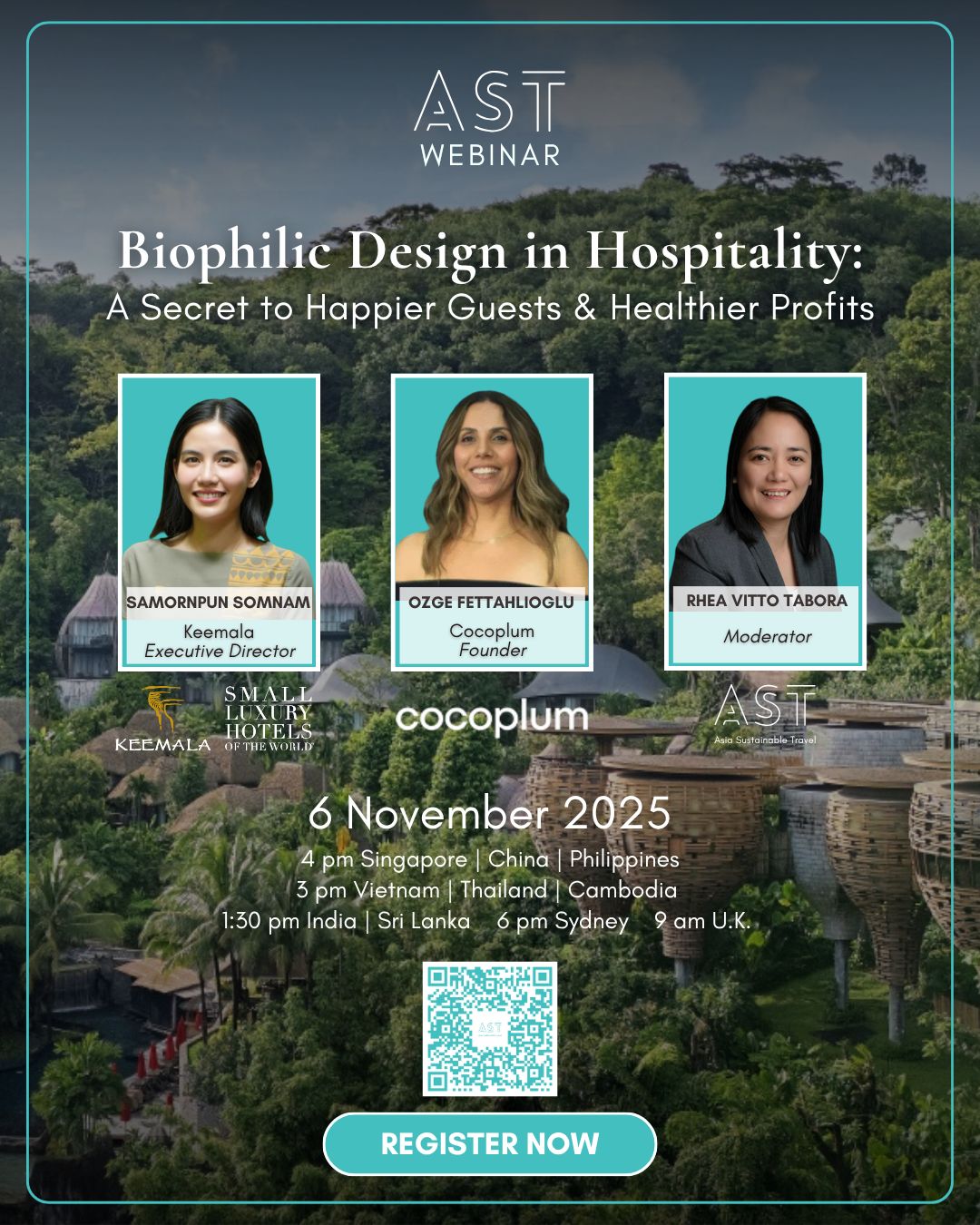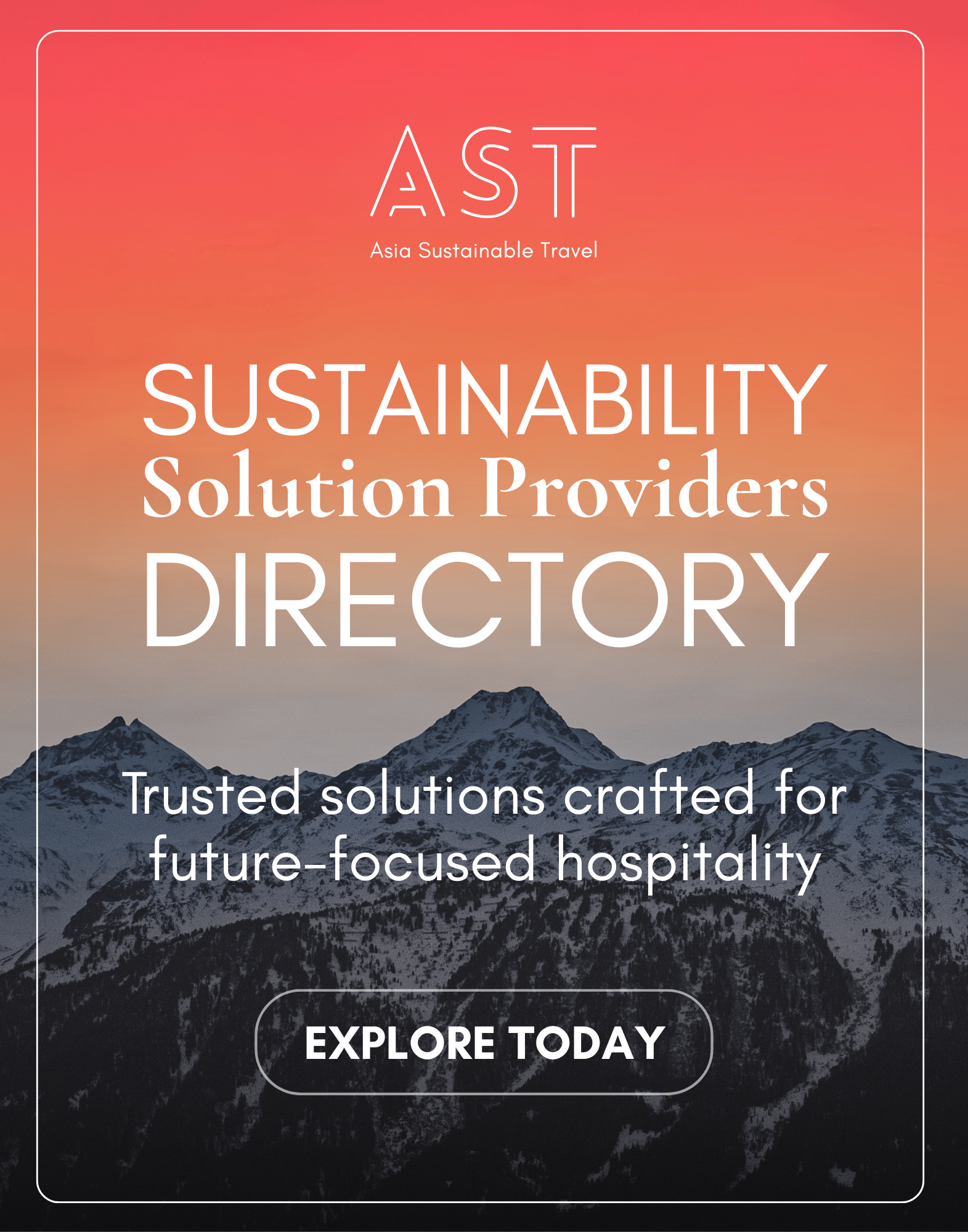- Asia Sustainable Travel
- Posts
- Are Your Sustainability Efforts Meaningful—or Just Measurable?
Are Your Sustainability Efforts Meaningful—or Just Measurable?
Dear AST friend,
We’re back from The TravMedia Summit and IMM Asia 2025 in Singapore, feeling inspired and energized. This two-day event brought together the region's leading travel media and international tourism brands, reinforcing the power of in-person connections and collaboration.
Our next stop? Further East in Bali, Nov 3–6, where we’ll reconnect with global leaders shaping Asia’s travel industry.
If you’ll be there too, reply to this email to schedule a quick chat with our Co-Founder, Jeremy Tran. He will moderate a panel discussion on regenerative design.
And speaking of design, have you saved your seat for our upcoming AST Webinar on Nov 6?
Join us for “Biophilic Design in Hospitality: A Secret to Happier Guests & Healthier Profits.” It’s a one-hour deep-dive into how nature-inspired design can boost wellbeing and your bottom line.
Finally, in this week’s Feature Story, we spotlight the biggest takeaways from the AST Forum for Next-Gen Leaders at the Far Eastern University in Manila that took place earlier this month.
If you like our content and want to support us, please share this newsletter with your friends to help us grow.
We plant a tree to welcome every new subscriber through our partnership with OneSeed.

Are Your Sustainability Efforts Meaningful—or Just Measurable?
When two typhoons in the Philippines delayed our Asia Sustainable Travel (AST) Forum for Next-Gen Leaders in Manila from September 23 to October 8, it was a timely reminder that climate-driven disruptions increasingly affect operations and planning.
The forum brought together Far Eastern University’s Institute of Tourism and Hotel Management (FEU-ITHM) students, faculty, and industry partners to explore the theme of “Transforming Travel into Sustainable and Meaningful Tourism.”
This theme echoes both World Tourism Day 2025’s call for ‘sustainable transformation’ and AST’s mission to prepare future leaders.
Our discussion with students highlighted why that mindset matters, and the key takeaways provide practical steps that hospitality executives can implement immediately.

Speakers Faith Quijano (General Manager of Citadines Roces Quezon City and Ascott Philippines' sustainability champion, fourth from right) and Rhea Vitto Tabora (Co-Founder of Asia Sustainable Travel and Meaningful Tourism Trainer for the Philippines, third from right), alongside Dean Harold Bueno (second from right) and the FEU-ITHM Faculty
1. Align Six Stakeholders, Not Just One
Prof. Dr. Wolfgang Georg Arlt, founder of Meaningful Tourism, believes that for tourism to be sustainable and profitable, it must align the objective benefits—things you can count, like revenue and jobs—and subjective satisfaction—the feeling of well-being and purpose, of the six key stakeholders: travelers, host communities, employees, companies, governments, and the environment.
Meaningful Tourism is not a new label but a call to action, requiring a commitment to aligning the interests of all six key stakeholders using measurable KPIs.
That’s why alignment was at the center of our discussion at the forum. Because when that alignment happens, we create a true win-win system built to last.
Some indicators of alignment:
Guests leave with a sense of meaning, not just entertainment.
Residents report improved quality of life, not tolerance.
Employees see career pathways, not seasonal churn.
Companies track triple bottom line, not arrivals alone.
Governments reinvest tourism taxes transparently.
The environment improves through specific metrics per guest-night (such as reduced carbon emissions, conservation of local wildlife), not just per brand campaign.
2. Make "Meaningful" Measurable with SMART KPIs
What isn’t measured can’t be managed. Replace generic goals with SMART (Specific, Measurable, Achievable, Relevant, Time-bound) Key Performance Indicators (KPIs) that you can track in routine workflows. Each KPI needs a designated owner and a regular reporting schedule.
Instead of relying solely on arrivals and revenue, the Meaningful Tourism paradigm asks deeper questions:
For Travelers: What percentage of guests report a " meaningful or transformative experience"?
For Host Communities: What is the change in resident sentiment toward tourism?
For Employees: What are the staff satisfaction and retention rates?
For the Environment: What is the reduction in CO2 emissions per guest night or water used per occupied room?
For the Company: What percentage of goods and services are locally sourced?
For Governments: What percentage of tourism taxes are reinvested into community and environmental projects?
These KPIs shift the focus of success from "more" to "better."
They offer a clear dashboard for executives to assess the health of their business ecosystem, identify risks, and discover new opportunities for value creation.
3. Prove the Business Case Early—Think RoS, Not Just ESG
Faith Quijano, a sustainability champion for Ascott Philippines and General Manager of Citadines Roces Quezon City, shared a key principle for leaders: view sustainability as Return on Sustainability (RoS)—a structured way to measure how decisions impact Internal Rate of Return (IRR) and risk.

4. Build a Governance Spine—From CEO Intent to Property Action
Strategy stalls without a clear structure. Ascott’s success relies on a governance model that flows from corporate to property level, with country-specific sponsors and champions who turn global goals into local actions.
This governance system ensures accountability.
5. Support Local Communities and Protect Culture by Sharing Control and Value
Quijano shared Ascott’s partnership with Rural Rising, an organization that supports distressed farmers by sourcing produce directly from them for F&B operations.
This demonstrates how integrating local communities into the supply chain can provide them with direct economic benefits while offering guests fresh, sustainable ingredients.
6. Make Guests and Staff Co-Creators of Impact
Guests don’t just want to see your sustainability story; they want to be part of it—if you make it easy and rewarding.
The most successful sustainability programs invite participation.

Join the AST Webinar on November 6
It’s free to attend the live webinar.
If you’re an AST Trailblazer, you’ll have access to the webinar recording along with the ready-to-use toolkit afterward.
Share, Connect, and Lead on AST Webinars in 2026
We’re setting the stage for 2026 in sustainable travel, climate action, marketing, and storytelling across Asia and beyond.
AST Webinars are known for high-quality, insight-driven discussions designed to empower our community’s professional growth.
Over the first six months of 2026, we’ll unpack pressing topics facing our industry:
Is Triple Win Possible? Guests Return, Communities Prosper, Nature Thrives
How to Build Next-Gen Leaders to Shape Tomorrow’s Success
Humans vs. AI: Are Travel Advisors Still Relevant?
Decoding the Carbon Funnel: From Measurement to Meaningful Action
We are now inviting forward-thinking speakers who can deliver insights and perspectives our audience can’t find anywhere else.
Are you ready to share your expertise, connect with a global network of high-level travel and hospitality professionals, and build meaningful business leads?
Applications are reviewed on a rolling basis. Sessions fill up fast, often three months in advance.
📩 How to apply?
Email [email protected]
Indicate which topic you are interested in speaking about.
In 2 to 3 sentences, tell us what makes you an expert on the said topic.

This newsletter may contain affiliate links. If you click on one and make a purchase, we may earn a commission at no additional cost to you. Our recommendations are based on thorough research and personal experience, and we only promote products and services we genuinely believe in. Thank you for supporting our work.










